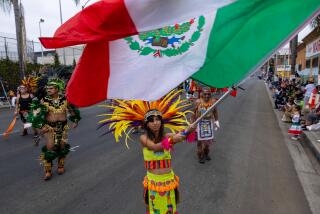Call Issued for Change in Cultural Perceptions
- Share via
Participants at the “Telling Our Story of the Americas” symposium said they hope that this year’s 500th anniversary celebration will stimulate a change in cultural perceptions through education.
“A lot of people take for granted the history of this country as they were taught in school or from the media,” said Hector Alejandro, chairman of the Hispanic Quincentennial Committee of Los Angeles, which sponsored the daylong event March 21 at USC.
American Indians, Mexican-Americans, Spanish-Americans and representatives from other ethnic groups at the symposium agreed that a change must occur--from a Eurocentric, one-race dominated society to a more equal, multicultural nation.
“There continues to be exclusion of people of color in the Americas,” said Prof. Reginald Daniels with the UCLA Latin American and African American Studies Centers.
“We have to come to agreement,” Daniels said, “that this democratic country was built on oppression of all ethnicities--African, Indian, Irish, Chinese and others. We have to acknowledge the blending of different cultures.”
Before a more egalitarian society can be achieved, some speakers said, society must first take a step back. Prof. Miguel Dominguez of Cal State Dominguez Hills said: “When we look at history, we have to ask the question ‘por que? ‘ The ‘why’ to today’s problems can be found in the past.” He added that the time is now to get on with solving those problems.
One speaker urged heeding the lessons of the past. “Global forces are shaping America once again, as they did during the colonial period,” said Julian Nava, former U.S. ambassador to Mexico, pointing to economic, political and social factors.
Participants in the symposium agreed that, despite arguments whether Christopher Columbus should be hailed or whether the 500th anniversary of his arrival in the Western Hemisphere should be commemorated rather than celebrated, the year provides an outlet for discourse that can lead to change.
“Events like this symposium give a forum for showing independent viewpoints and learning that they exist,” said speaker Lemont Laird, a Shawnee Indian visiting from an Oklahoma reservation.
“I am not upset by (the quincentennial) as much as I am about the message it could bring out that perpetuates preconceived stereotypes of the Indian,” said Dwight Howe, outreach assistant with the Southern California Indian Center. “So I am much more concerned with bringing out the whole story and rewriting the history books to reflect that.”
Revamping school curricula so that they represent several cultures and not just history as written by Caucasian males is an important factor in changing attitudes, many speakers said. They referred several times to the “healing process” among Americans that can best be achieved through education.
Nava said: “Only narrow pride would cause people to claim their perspective as the truth. By trying to reach an understanding of all different perspectives and what is human, we can benefit from the racial and cultural diversity in modern times.”
The day offered a series of workshops, as well as performances by the Aztec dance troupe Xipe Totec and two music groups, Miriam Mita and Ayulla Sankayo of Bolivia and Grupo Chaarip of Ecuador.
More to Read
Sign up for Essential California
The most important California stories and recommendations in your inbox every morning.
You may occasionally receive promotional content from the Los Angeles Times.










